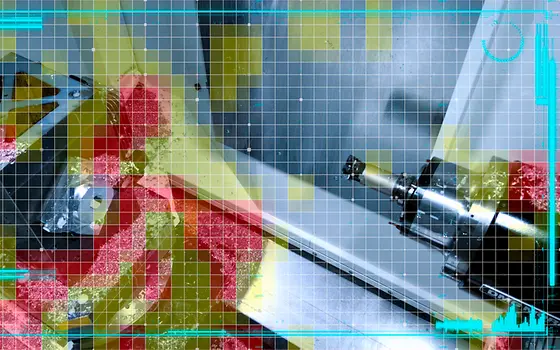DMG Mori: Artificial Intelligence In Production
Artificial intelligence and algorithms from the field of machine learning are considered to have a promising future. In the course of the continuing trend of industrial digitization on the way to the era of Industry 4.0, their use is being discussed in a wide variety of scenarios. In mechanical engineering and the manufacturing industry, this opens up new perspectives for digitized value creation.
Birth of artificial intelligence
Concepts of artificial intelligence have also become present in industry in the course of digitalization. However, numerous theories, topics and technologies have been and are subsumed under the buzzword AI. So what is meant by artificial intelligence? The intellectual foundation of artificial intelligence can already be seen in a research proposal submitted for this purpose in 1955.
At that time, a team of scientists submitted a proposal to hold a seminar with ten participants at Dartmouth College during the summer of 1956. They were convinced that, in principle, all aspects of learning and other features of intelligence could be described in such detail that a machine could be built to simulate these processes. The idea was to try to figure out how machines could be made to use language, make abstractions, and develop concepts and continue to improve themselves. Tasks of the kind that were then the sole preserve of human intelligence.
Artificial Intelligence Today
Said “machine” is ubiquitous with the computer. And even today, the concepts and algorithms of artificial intelligence follow the basic assumptions that were established at the Dartmouth Conference in the USA in 1956. Depending on their orientation, various sub-forms have emerged in the process. The research field of artificial intelligence includes a whole range of processes and technologies.
The different AI areas:
- Machine Learning
- Neural Networks
- Natural Language Processing
- Genetic Algorithms
- Computational Creativity
Machine learning is currently probably the most influential subarea of artificial intelligence in production and manufacturing. It involves the analysis of data by computer systems, the further, independent development of correlations and the triggering of corresponding actions. Machine learning as a form of artificial intelligence is closely linked to the topic area of Big Data. These two trends are mutually reinforcing. This is because enormously extensive data stocks, which can hardly be handled with conventional methods of data processing, have become ubiquitous in today’s digitally dominated age.
As a result of the convergence of information and production technology and the resulting networking, more and more machines and plants are also becoming part of an industrial Internet of Things. The resulting data is now available en masse as a raw material for digital value creation. However, this raw material has yet to be converted into practical benefits and added value for customers.
AI turns data into knowledge

This is probably one of the reasons why there is currently so much interest in the use of artificial intelligence solutions. There is no doubt that economic added value in the form of knowledge can be generated from mere data. The corresponding potential lies both in the manufacturing process itself and in the upstream and downstream processes. Future fields of application of artificial intelligence, especially of machine learning concepts, are diverse and affect all areas of the value chain.
Data is therefore becoming a raw material from which new application scenarios for machine learning are constantly being developed. The optimization and automation of processes in particular currently offer the greatest opportunities. Data is used to generate additional information and refine it into new product or process knowledge. This can then be used to initiate a continuous improvement process that can be continued in a kind of endless loop and optimized again and again.
Intelligent algorithms in manufacturing and production
What is already possible today is demonstrated by the AI-supported chip disposal from DMG MORI. Chips are a frequent cause of machine downtime or serious malfunctions. The “AI Chip Removal” analyzes chip production based on artificial intelligence and ensures automatic chip disposal.
The technical basis is provided by two high-resolution cameras in the machine’s working chamber. They provide clear images of the interior throughout. Based on the images, the “AI Chip Removal” system recognizes where and how many chips are accumulating. In the process, the artificial intelligence gets to know the prevailing conditions in the workspace better and better. The AI Chip Removal system thus becomes better and better at determining the optimum cleaning method: Depending on the position of the chips, the artificial intelligence finds the best flushing path. Furthermore, it decides on the necessity of chip removal and the optimal use of coolant for flushing. For this purpose, the coolant nozzles are automatically adjusted so that the chip disposal produces an ideal result.

Away from the machine, in the upstream processes, up2parts calculation sets new standards in the efficiency of work preparation. up2parts GmbH, a strategic partner of DMG MORI, develops solutions for small and medium-sized companies to increase efficiency and reduce costs using artificial intelligence. With the software tool, work plan and costing proposals are generated fully automatically based on individual company data through an AI-supported analysis of 3D models. Each component calculation automatically trains the company-specific intelligence and generates more extensive data sets – for increasingly precise results.
DMG MORI relies on diversity of artificial intelligence
The analysis of data by artificial intelligences is increasingly proving to be a decisive factor for the economic efficiency of manufacturing systems and, against this background, is also gaining in importance for DMG MORI. The aim is to sustainably increase the performance, accuracy and cost efficiency of machine tools, automation solutions and processes in a combination of artificial intelligence and a “mirroring” of the results in digital twins.
This content was originally published on the DMG Mori website.

